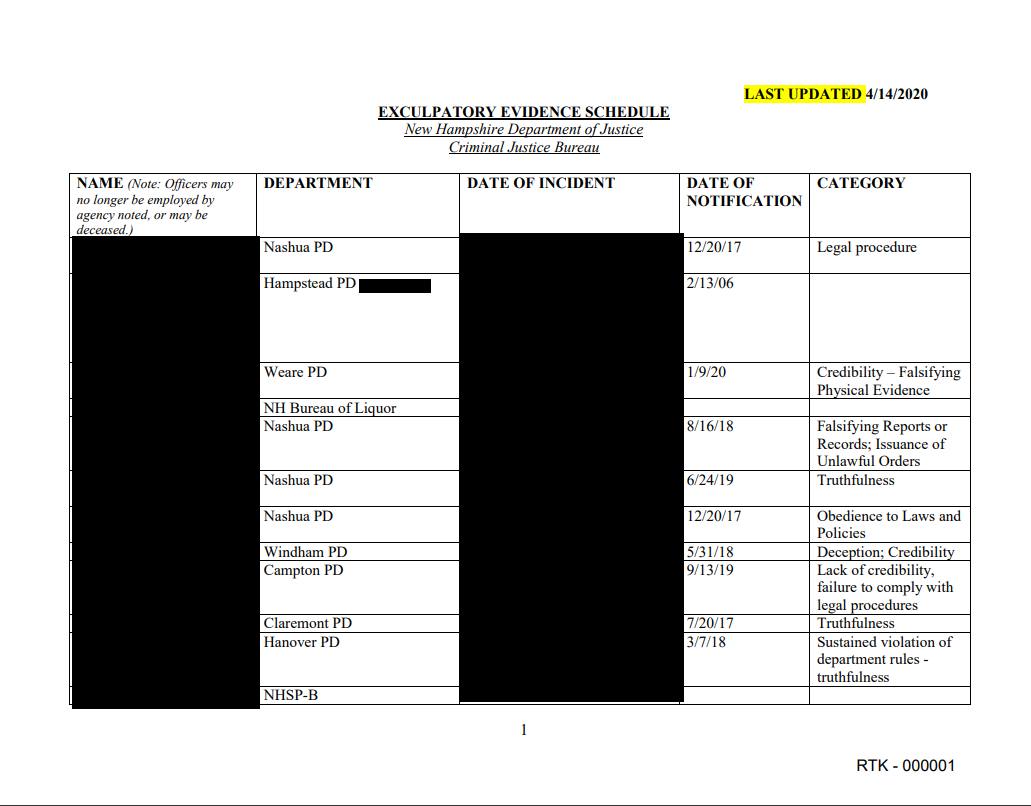By NANCY WEST, InDepthNH.org
NASHUA – The state Attorney General’s Office, five news outlets and ACLU-NH have jointly asked the court to delay the lawsuit against the state seeking to make public the redacted names on the Laurie List of dishonest police until July 1.
They argued in a joint motion to stay the proceedings Friday that if amended House Bill 471 passes the legislature, it would make further litigation unnecessary because the resulting new law would make public the Laurie List, which is now called the Exculpatory Evidence Schedule (EES).
The lead plaintiff, New Hampshire Center for Public Interest Journalism, disagrees and wants the case to stay on track, having first been argued Oct. 19, 2018 in Hillsborough Superior Court South.
Friday’s joint motion states: “The proposed statute (House Bill 471) codifies a recommendation from the New Hampshire Commission on Law Enforcement, Accountability, Community, and Transparency (‘LEACT Commission’) that the EES be made public after every officer on the list has been notified that he or she is on the EES and has been informed that he or she has up to 180 days to decide whether to challenge his or her inclusion on the EES.”
The motion revealed the results of the confidential negotiations that have been going on for months between Solicitor General Dan Will for the state and The Telegraph of Nashua, Union Leader Corporation, Newspapers of New England, Inc., Seacoast Newspapers, Inc., Keene Publishing Corporation, and the American Civil Liberties Union of New Hampshire.
Andru Volinsky, who represents the New Hampshire Center for Public Interest Journalism since ACLU-NH withdrew as its counsel, plans to file an objection in Hillsborough Superior Court South on Wednesday.
“While l appreciate the effort of the other parties, I on behalf of my client the New Hampshire Center for Public Interest Journalism, will oppose the request for a stay,” Volinsky said.
“Resolving this important litigation through of any piece of legislation is highly uncertain. Moreover, the proposed legislation does not sufficiently respect the public’s interest in the Laurie List while showing too great a deference to those who may have their conduct revealed by publication of the list,” Volinsky said.
See motion to stay and House Bill 471 here. https://indepthnh.org/wp-content/uploads/2021/04/Partially-Joint-Motion-to-Stay-1.pdf
ACLU-NH and the then-six news outlets argued Oct. 19, 2018 that the list that then contained the redacted names of 171 law enforcement officers with credibility problems should be public. Solicitor General Will maintained it is confidential by law. At last public count, there were 284 redacted names on the list.
On April 24, 2019, Superior Court Judge Charles Temple ruled in favor of the news outlets and ACLU-NH saying the EES, the list of dishonest police, is a public record and is not exempt under RSA 91a, the state’s right-to-know law. But former Attorney General Gordon MacDonald appealed the ruling to the state Supreme Court.
The Supreme Court ruled on Oct. 30, 2020, that the list is a public document, but sent the case back to Judge Temple to determine the privacy rights of the officers on the list, which is where the case stands now.
The Senate Judiciary Committee will hold a public hearing on HB 471 via Zoom on Thursday at 1 p.m. where members of the public can speak.
Link to Zoom Webinar: https://www.zoom.us/j/99568630852
To listen via telephone: Dial 1-301-715-8592, or 1-312-626-6799 or 1-929-205-6099, or 1-253-215-8782, or 1-346-248-7799, or 1-669-900-6833
To sign in to speak, register your position on a bill and/or submit testimony, use this link: http://gencourt.state.nh.us/remotecommittee/senate.aspx
The lists were well-kept secrets until 2012 when the New Hampshire Union Leader and then other newspapers began reporting on them. At the time, there were separate lists kept by the 10 county attorneys and there were about 50 redacted names on the lists.
See copy of the April 2020 list here: https://drive.google.com/file/d/1PumiMcSlQCBqCm9sKkBYNJFUu10GWE8-/view?ts=5f371bab
In 2017 the Attorney General’s Office centralized the list under its authority. The list contains the redacted name, the unredacted department, sketchy details about the discipline that landed the officer on the list and some entries include the date the name was placed on the list. Also redacted is the date of the incident that caused the officer to be placed on the list.
The list is used to alert prosecutors when they are constitutionally obligated to alert criminal defendants of the officer’s sustained discipline for issues relating to his or her ability to testify truthfully against the defendant.
The requirement stems from the 1963 U.S. Supreme Court case Brady v. Maryland and others including the 1995 New Hampshire Supreme Court case state v. Laurie, which was overturned because the defendant Carl Laurie wasn’t notified that the lead police officer in his homicide case had serious, known credibility issues.
Sustained discipline in an officer’s confidential personnel file can sometimes be considered exculpatory evidence, or evidence that is in the defendant’s favor.
Some of the reasons already public for an officer getting on the list include: untruthfulness, sexual harassment, excessive force, egregious dereliction of duty, receiving stolen property investigation and deliberately lying during a court case or administrative hearing.
Disclaimer: The NH Center for Public Interest Journalism publishes online this news outlet, InDepthNH.org





